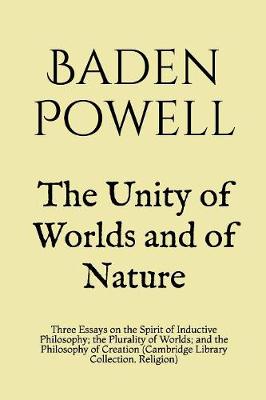Cambridge Library Collection - Science and Religion
2 total works
Baden Powell (1796-1860) was a mathematician who held the Savilian Chair of Geometry at Oxford, and was also a priest in the Church of England. He was a defender of the claims of new scientific discoveries in the face of Christian orthodoxy well before Darwin published the theory of evolution, and drew a clear distinction in his thinking and writing between moral and physical phenomena, as being independent of each other and the fields of completely different study. Darwin himself wrote, in the 'Historical Sketch' at the beginning of the third edition of On the Origin of Species, 'The 'Philosophy of Creation' has been treated in a masterly manner by the Rev. Baden Powell, in his Essays on the Unity of Worlds, 1855. Nothing can be more striking than the manner in which he shows that the introduction of new species is 'a regular, not a casual phenomenon'.'
Essays and Reviews
by Frederick Temple, Rowland Williams, Baden Powell, Henry Bristow Wilson, Charles Wycliffe Goodwin, Mark Pattison, and Benjamin Jowett
Published December 1970
Comprising seven essays by learned contributors and controversially advocating a rationalist Christianity, this work became a sensation upon publication in 1860. Frederick Temple (1821-1902), later Archbishop of Canterbury, wrote on the cultural contributions of non-Christians; Roland Williams (1817-70), Professor of Hebrew at Lampeter, questioned Old Testament prophesies; Baden Powell (1796-1850), Oxford Professor of Geometry, challenged belief in miracles and embraced Darwinism; Henry Bristow Wilson (1803-88) questioned literal biblical history; the only lay contributor, Egyptologist Charles Wycliffe Goodwin (1817-78), embraced geology; Mark Pattison (1813-84), tutor at Lincoln College, wrote on the history of rationalist theology; and Benjamin Jowett (1817-93), Oxford Professor of Greek, advocated a historical reading of the Bible. Wilson and Williams were later found guilty of heresy by a Church court, though this was overturned on appeal. For readers interested in the theological controversies of the Victorian era, these essays remain invaluable.

